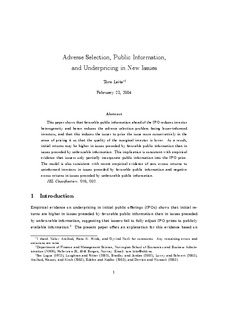| dc.contributor.author | Leite, Tore | |
| dc.date.accessioned | 2006-07-13T10:04:56Z | |
| dc.date.available | 2006-07-13T10:04:56Z | |
| dc.date.issued | 2004-02 | |
| dc.identifier.issn | 1500-4066 | |
| dc.identifier.uri | http://hdl.handle.net/11250/163841 | |
| dc.description | Revised 23.02.04
Tittel i BIBSYS: Adverse selection in new issues revisited | en |
| dc.description.abstract | This paper examines the role of adverse selection in the pricing of new issues when all investors may be privately informed about the firm, and in which public information is observed prior the issue date. The precision in the information observed by the marginal investor is shown to be higher under unfavorable public information than under favorable public information. Consistent with recent empirical evidence, the model implies that while the Rock (1986) prediction of a zero excess allocation-weighted return to uninformed investors may hold in issues preceded by favorable public information, it will not hold in issues preceded by unfavorable public information, predicting instead negative excess allocation-weighted returns to uninformed participation in this case. Finally, consistent with recent findings that issuers do not seem to fully incorporate public information into the offer price, the model allows for initial returns to be higher in issues preceded by favorable public information compared to favorable public information. | en |
| dc.format.extent | 235355 bytes | |
| dc.format.mimetype | application/pdf | |
| dc.language.iso | eng | en |
| dc.publisher | Norwegian School of Economics and Business Administration. Department of Finance and Management Science | en |
| dc.relation.ispartofseries | Discussion paper | en |
| dc.relation.ispartofseries | 2003:19 | en |
| dc.title | Adverse selection, public information, and underpricing in new issues | en |
| dc.type | Working paper | en |
